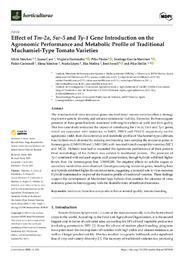Por favor, use este identificador para citar o enlazar este ítem:
https://hdl.handle.net/11000/37852Registro completo de metadatos
| Campo DC | Valor | Lengua/Idioma |
|---|---|---|
| dc.contributor.author | Sánchez, Alicia | - |
| dc.contributor.author | Cava, Juana | - |
| dc.contributor.author | Hernández, Virginia | - |
| dc.contributor.author | Flores, Pilar | - |
| dc.contributor.author | García Martínez, Santiago | - |
| dc.contributor.author | Carbonell, Pedro | - |
| dc.contributor.author | Sánchez, Elena | - |
| dc.contributor.author | López, Nuria | - |
| dc.contributor.author | Molina, Elia | - |
| dc.contributor.author | Fenoll, José | - |
| dc.contributor.author | HEllín, Pilar | - |
| dc.contributor.other | Departamentos de la UMH::Biología Aplicada | es_ES |
| dc.date.accessioned | 2025-11-04T11:45:13Z | - |
| dc.date.available | 2025-11-04T11:45:13Z | - |
| dc.date.created | 2025-07 | - |
| dc.identifier.citation | Horticulturae 2025, 11(7), 838 | es_ES |
| dc.identifier.issn | 2311-7524 | - |
| dc.identifier.uri | https://hdl.handle.net/11000/37852 | - |
| dc.description.abstract | The introduction of virus resistance genes into traditional tomato varieties offers a strategy to preserve genetic diversity and enhance commercial viability. However, the homozygous presence of these genes has been associated with negative effects on yield and fruit quality. This two-year study evaluated the impact of introducing the Tm-2a, Sw-5 and Ty-1 genes, which are associated with resistance to ToMV, TSWV and TYLCV, respectively, on the agronomic yield, fruit characteristics and metabolic profile of Muchamiel-type cultivars. Four hybrids were obtained by crossing two breeding lines carrying the resistance genes in homozygosis (UMH1139 and UMH1200) with two traditional susceptible varieties (MC1 and MC2). Hybrids matched or exceeded the agronomic performance of their parents. Fruit morphology of the hybrids was similar to traditional parents. The presence of Ty-1 correlated with reduced organic acid concentration, though hybrids exhibited higher levels than the homozygous line, UMH1200. No negative effects on soluble sugars or secondary metabolites were observed. Genotypes carrying resistance genes, breeding lines and hybrids exhibited higher flavonoid contents, suggesting a potential role in virus response. Hybrids maintained or improved the bioactive profile of traditional varieties. These findings support the development of Muchamiel-type hybrids that combine the presence of virus resistance genes in heterozygosity with the desirable traits of traditional tomatoes. | es_ES |
| dc.format | application/pdf | es_ES |
| dc.format.extent | 20 | es_ES |
| dc.language.iso | eng | es_ES |
| dc.publisher | MDPI | es_ES |
| dc.rights | info:eu-repo/semantics/openAccess | es_ES |
| dc.rights.uri | http://creativecommons.org/licenses/by-nc-nd/4.0/ | * |
| dc.subject | landraces | es_ES |
| dc.subject | bioactive composition | es_ES |
| dc.subject | flavor-related quality | es_ES |
| dc.subject | tomato breeding | es_ES |
| dc.subject.other | CDU::5 - Ciencias puras y naturales::57 - Biología | es_ES |
| dc.title | Effect of Tm-2a, Sw-5 and Ty-1 Gene Introduction on the Agronomic Performance and Metabolic Profile of Traditional Muchamiel-Type Tomato Varieties | es_ES |
| dc.type | info:eu-repo/semantics/article | es_ES |
| dc.relation.publisherversion | https://doi.org/10.3390/horticulturae11070838 | es_ES |

Ver/Abrir:
horticulturae-11-00838 2025.pdf
2,05 MB
Adobe PDF
Compartir:
 La licencia se describe como: Atribución-NonComercial-NoDerivada 4.0 Internacional.
La licencia se describe como: Atribución-NonComercial-NoDerivada 4.0 Internacional.
.png)